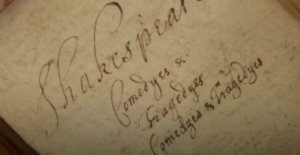
I don’t think we’ve ever done this before. What are your life’s goals with respect to Shakespeare? Which ones have you accomplished, and what’s your progress toward the next one?
- Publish something. Done – Hear My Soul Speak is available for download on Amazon!
- Teach something. Done – I volunteered in my children’s classes throughout elementary school where I taught Macbeth, Hamlet, Midsummer and others. Always excerpt type stuff, never a full production, but we definitely got the kids up on their feet.
- Be invited to speak on a Shakespearean subject. Done – Bardfilm invited me to speak to one of his college classes.
- Make some money at this. Not “make a living at it,” since given my day job that’s highly unlikely. But I’ve had this hobby now for well over ten years, if I don’t at least try to make it pay for itself I’m missing an opportunity. I’m pretty pleased so far with how the line of Shakespeare Geek Merchandise has been selling. (Check it out, new designs going up regularly!)
Still On The List
- Visit Stratford on Avon. This is one of the most common questions I’m asked (behind “What’s your favorite play?”) As the years go by I see people all around me going, and wondering why I haven’t been. It’s hard to explain. At this point I’ve built it up in my head like a religious pilgrimage. I could never see myself going without my family, because I wouldn’t deprive them of sharing that experience with me. But if I’m going to take an international trip with a family of five, well then the world is a big place and there’s lots of options, I’m not going to call dibs on the place *I* want to go at everybody else’s expense.
- See all the plays. This one’s probably on most people’s lists. It’s particularly tricky to find a performance of some of the more obscure plays, I know, but I’ve still got a lot of the basics yet to see. To date I’ve seen, let’s see if I can do this off the top of my head: Hamlet, Lear, Macbeth, Othello, Romeo and Juliet, Coriolanus, Tempest, Midsummer, Shrew, Comedy of Errors, Two Gentlemen of Verona, All’s Well That Ends Well, Much Ado, Twelfth Night, As You Like It, Love’s Labour’s Lost, Winter’s Tale. So really I’m only about halfway there. This summer they’re doing Richard III in Boston so I’ll be able to check that one off as well.
- Publish something real. Not to discount my efforts on the ebook, but that project started out much bigger in my head, intending to write the definitive guide to Shakespeare and weddings. As time went by it got smaller and smaller and eventually turned into a “Just finish this” project. The next time I try it I want to do something that’s physically published, something that can sit on my bookshelf. And preferably sell for more than ebook prices 😉
- Perform. I don’t expect to ever be cast in a show, nor would I want to be. But on the flip side I’ve literally dreamed about spontaneously standing on a desk and delivering a monologue to a rapt audience. At some point before I die I’d like to achieve something in between the two.
Your turn!

 Today while following some random Google rabbit hole to Love’s Labour’s Won, I found The Lost Plays Database.
Today while following some random Google rabbit hole to Love’s Labour’s Won, I found The Lost Plays Database.
 I saw a post on Reddit today that asked, “What’s the first thing you think of when you hear the word Shakespeare?”
I saw a post on Reddit today that asked, “What’s the first thing you think of when you hear the word Shakespeare?”